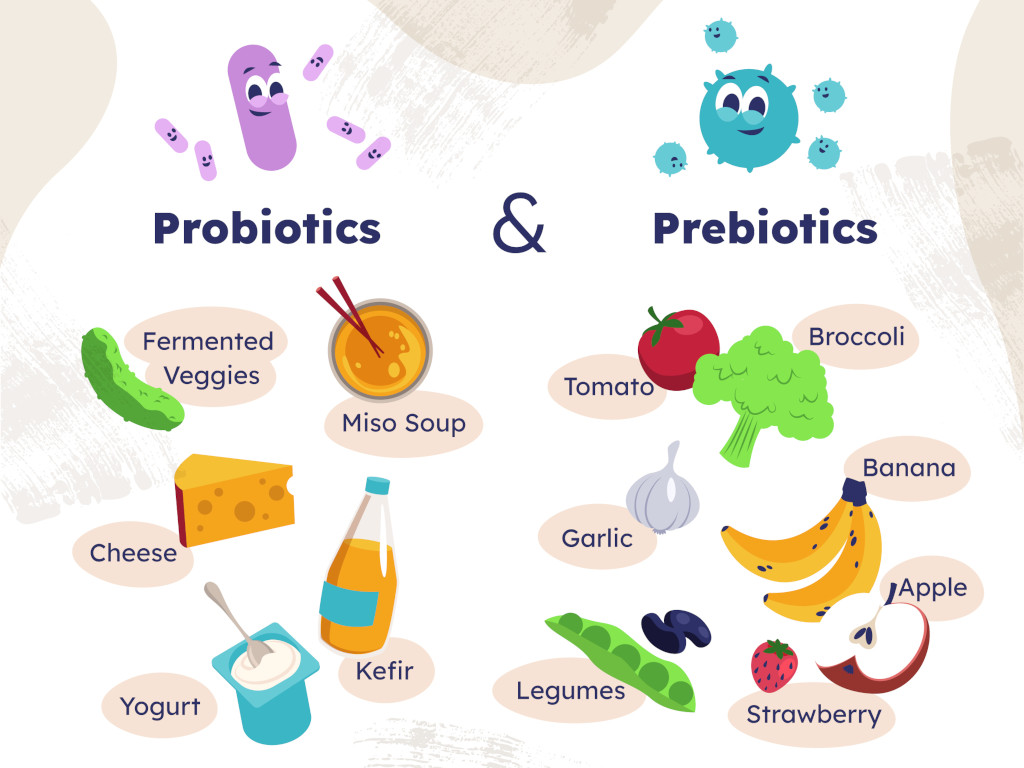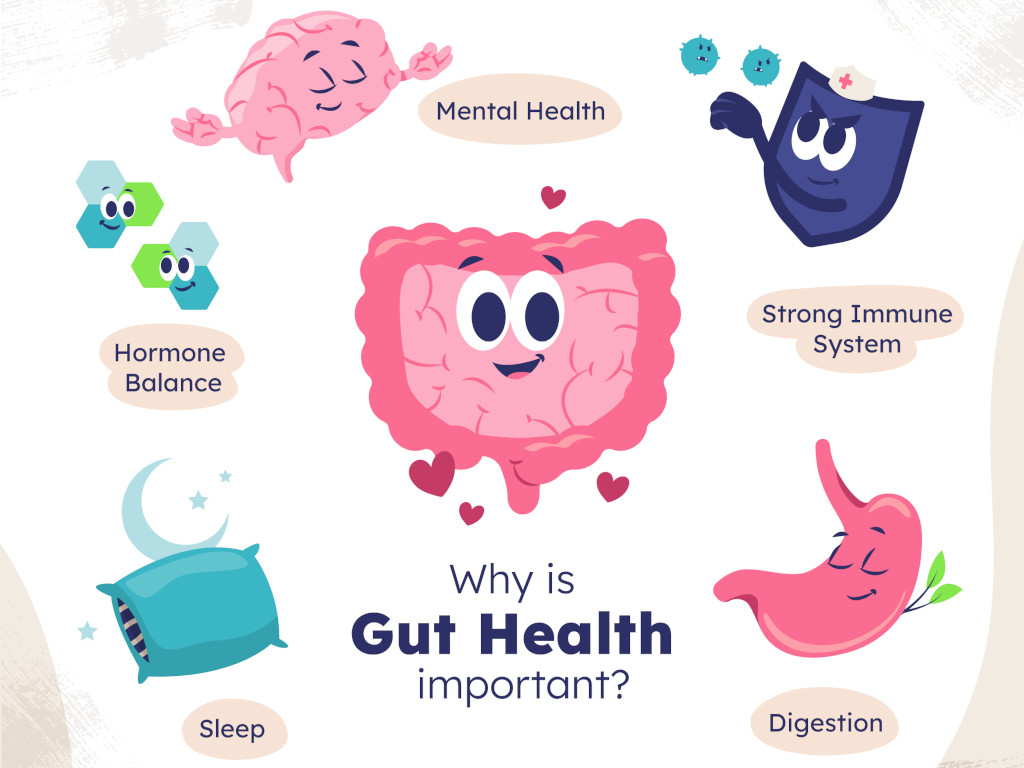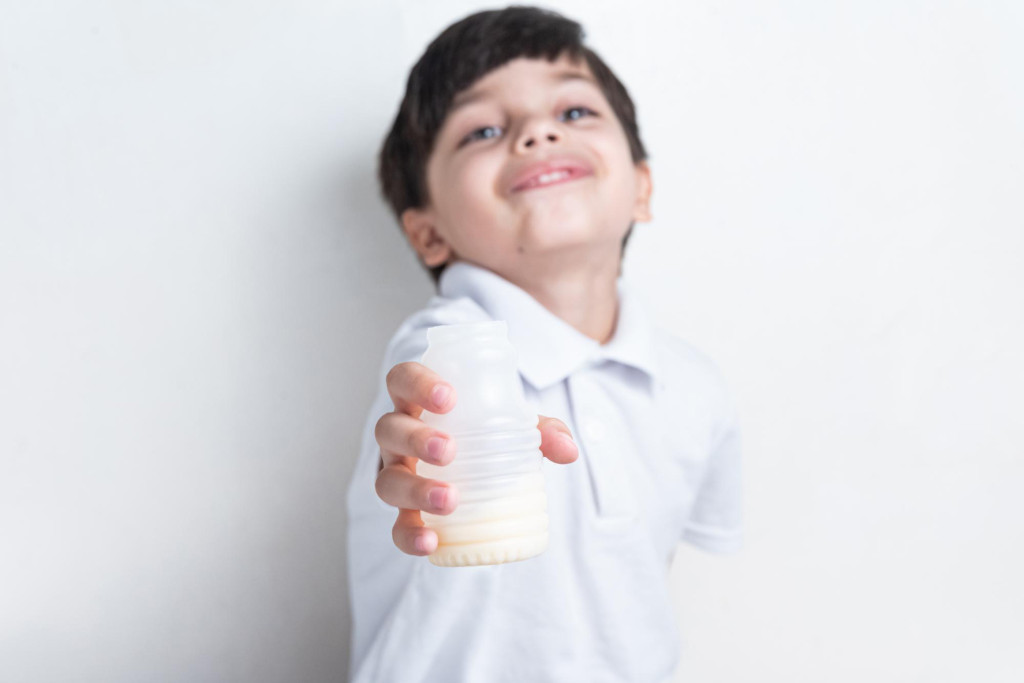SingaporeMotherhood | Baby & Toddler
September 2023
Are Probiotics Good for Babies, Children, Pregnant & Breastfeeding Mums?

Probiotics is such a buzzword these days. But how much does the average person really know about these so-called good bacteria? For example, is it safe to munch on those probiotic gummies while you’re pregnant or breastfeeding? At what age can your kiddos join the probiotic party — and do they really need it? Plus, who knew that those microscopic gut warriors could also double up as your mental health sidekicks?
Pun alert! Well, don’t strain your brain on the topic. Take it from public nutritionist Connie Pang, who gamely answers our gut-wrenching questions and dishes out some cultured advice.
1. What are probiotics?
Probiotics are live microorganisms that when taken in adequate amounts, provide a health benefit to the host1 — that’s you! What benefits you receive depend on the type of probiotic and the amount — or number of colony forming units (CFU) — you take. In other words, you can treat different health imbalances with different probiotic strains and doses.
(See also: DO YOUR KIDS REALLY NEED SUPPLEMENTS? 11 OF YOUR QUESTIONS ANSWERED BY A PHARMACIST)
2. Where do probiotics in supplements come from?
Microbes are all around us, living in and on our bodies, as well as in our environments. Therefore, probiotics can come from a variety of sources. For instance, human-derived probiotics can be cultivated from the natural bacteria existing in our digestive tract or even breast milk. Probiotics can also originate from foods, such as dairy, and more rarely from soil or other agricultural sources.
To culture (grow) probiotics, lab workers first isolate bacteria from their origin and feed them nutrients suitable for each strain. Then under careful conditions, the beneficial bacteria thrive and multiply through a fermentation process. Finally, the harvested probiotic bacteria is freeze-dried to ensure they stay fresh for a long time even at room temperature2.
3. We also hear about prebiotics. What’s the difference?

An easy way to understand is to see probiotics as healthy microbes and prebiotics as food for healthy microbes. Prebiotics are typically dietary substances that humans can’t digest, but microbes love to eat, such as indigestible carbohydrates and fibre. They are also naturally present in breast milk! When probiotic bacteria feast on their favourite ‘food’, they can produce important nutrients, metabolites, and enzymes for their host3.
4. So how do probiotics function?
According to recent findings, having a well-balanced gut is not just about good digestion. It turns out that our digestive system is like a superhighway that links to the rest of our body and even our brain! This means gut bugs can influence our health via the immune system, brain chemicals, and hormones. So when the gut is happy and balanced, it helps keep our whole body and mind healthy. But when things go out of whack, it can lead to problems like mild anxiety, mild acne, and irritable bowel syndrome (IBS).
The walls of our digestive system are connected to millions of nerve cells that affect the emotional and cognitive centres of the brain. It’s hard to imagine how tiny microorganisms in the gut can affect you emotionally. But when those 38 trillion bacteria are thrown off balance, mental health problems, such as depression and anxiety, can arise.
– Alex Georgiou, naturopathic practitioner & medical researcher for Life-Space Group
Scientists also discovered that people with medically diagnosed IBS have different microbial communities than those with healthy bowel function. They are now investigating using probiotic therapy to treat it. For example, Lactobacillus plantarum 299v sticks to the bowel lining and helps ease tummy pains, bloating, and gas4. This probiotic superhero also helps keep our bowels working the way they should.
(See also: 4 EASY RECIPES TO BOOST YOUR IMMUNE SYSTEM)
5. How are probiotics good for our bodies?

Probiotic bacteria supports our health in the following ways:
- Digestion of foods
- Production of nutrients
- Crowding out ‘bad’ bacteria/pathogens
- Maintaining the health of the gut wall
Research shows that these actions combine to support multiple body systems, including immune system functions5. Here’s a cool fact: about 70 per cent of your immune system hangs out in and around your gut. Therefore, the health of your gut and its tiny residents (called the gut microbiome) affects it too. Think of it like a buddy system — a healthy gut boosts a healthy immune system and vice versa.
And guess what? Specific probiotic strains can give your immune system a high-five, targeting the upper respiratory system in both kids and adults. This helps you fight off those pesky colds and stuffy noses!
6. How do probiotics support mental wellbeing?
The relationship between the gut microbiome and our stress response is also a two-way street6. Stress affects the microbiome and vice versa. Ever lost your appetite when you’re nervous or craved comfort foods when you’re sad? Then you’ve experienced the microbiome-gut-brain axis in action. Probiotics can help support this axis by maintaining good housekeeping in your belly.
Did you know that transferring microbes from one mouse to another can also lead to the transfer of personality traits such as timidness or boldness?! The science behind the role of the gut microbiome in the brain, nerves, and mood health continues to grow, as do the potential benefits of probiotics. I am excited to see what is next in this space.
– Connie Pang, public nutritionist (B.SNutSc) & educator for Life-Space Group
(See also: 10 EFFECTIVE WAYS TO HELP YOUR CHILD COPE WITH STRESS)
7. Can probiotics help with women’s health?

Both the gut and the vagina are home to their own unique microbiome communities. Many of us know the importance of vaginal hygiene when it comes to supporting vaginal and urinary tract health. However, did you know that you can also help ensure a healthy vaginal microbiome by maintaining a healthy gut?
Given how close the intestinal tract is to the female vaginal tract, it makes sense that a communication pathway between the two systems exists7. Indeed, researchers found that certain probiotic strains can journey through the gut and into the vagina via the gut-vagina axis. That’s why taking an oral probiotic supplement can help to support a healthy female reproductive tract.
8. Is it safe for pregnant and breastfeeding mums?
Taking probiotics in pregnancy is generally considered safe, and may even offer many benefits to mum and baby. Recent studies show that probiotics significantly improve pregnancy-related nausea, vomiting, and constipation8.
In addition to the gut-vagina axis, research also uncovered the gut-breast axis. This pathway allows microbes to travel from the mother’s gut to her breast milk, eventually seeding the infant’s gut microbiome. This isn’t just important for a child’s growth and development, but also for the mother’s health. An unbalanced breast milk microbiome may lead to mastitis, which is painful for mum and might even cause her to stop breastfeeding. Conversely, certain strains of probiotics can reduce the symptoms of mastitis, while others can help build baby’s immune system through breastfeeding9.
(See also: CARE, PROBLEMS, AND TREATMENTS FOR YOUR BREASTS AFTER GIVING BIRTH, AND BREASTFEEDING)
9. At what age can children start taking probiotics?

Children need strong immune systems to thrive. Of course, to have a top-notch immune system, kids need those gut bugs in good shape. Now, here’s the thing: gut buddies start setting up shop during the first 1,000 days of a child’s life10. This is a critical window of opportunity to lay the foundations for a healthy immune system.
As children grow and develop, so does their microbiome. From the introduction of new foods to daily interactions with family and pets, curious explorations of their surroundings expose children to myriad microbes. And for a rich microbiome, the more they are exposed to, the merrier.
But here’s the catch: our modern lifestyles means we often do things that aren’t good for our gut buddies. We eat low-fibre diets, live in super-clean homes, and take medicines that kill the bad bugs (and some good ones). All this can make our gut microbiome less diverse, and that’s not great for our immune system because it needs to be tough and used to the world around us.
Make up for this by ensuring your kids eat a varied diet and spend plenty of time playing in nature. Probiotic supplements can also help — just make sure it’s specifically designed for their age group and health needs. Breast milk is the preferred source of prebiotics for babies under six months old11.
(See also: FIRST 1,000 DAYS OF A CHILD’S LIFE – FATHERS, IT’S YOUR TIME TO STEP UP)
10. I make it a point to eat a clean, healthy, balanced diet. Do I still need probiotics?
Eating a healthy, balanced diet and also exercising regularly definitely help. However, our gut microbiome faces many challenges, including medications, stress, and our own cravings for indulgent foods and drinks. Taking probiotics can help to prevent and combat the build-up of unhealthy levels of ‘bad’ bacteria by restoring microbial balance.
11. I take yoghurt and kombucha regularly, and my kids drink Yakult daily. Is that enough?

Fermented foods are a great way to support your microbiome and general health. But while often talked about interchangeably, fermented foods and probiotics are not one and the same. Common examples of fermented foods include kefir, kombucha, sauerkraut, kimchi, miso, yoghurt, and sourdough bread. They generally contain healthy nutrients including prebiotics and probiotics.
However, probiotics can provide health benefits specific to the type of probiotic and the amount of CFUs, whereas the types and amounts of microbes in fermented foods vary significantly between food types, as well as cooking or processing techniques. Also, some fermented foods, such as certain brands of yoghurt, may contain high levels of sugar and artificial preservatives.
Do you know that there is 17.2 g of sugar per 100 ml of Yakult? It’s higher than Cola-Cola’s sugar content at 10.6 g of sugar per 100 ml.
(See also: 5 FABULOUS FERMENTED FOODS FOR A HEALTHY GUT AND BETTER IMMUNITY)
12. What should we look out for when purchasing probiotic supplements?
Before purchasing supplements, it’s important to understand what kind of health issues you want to address. There are various probiotic strains available in the market, each targeting different health concerns. For instance, Lactobacillus Rhamnosus HN001 can help support immune health in young children12, whereas Lactobacillus Fermentum CECT5716 can reduce the symptoms of mastitis13.
The needs of the microbiome also evolve as we age, from pregnancy through to infancy, childhood, adulthood, and our senior years. Make sure you choose reputable supplement brands and formulations to suit each family member’s life stage and health needs.
13. Can we have too much probiotics?
Just as with any other supplement or food, it is possible to take too many probiotics, so make sure you follow the recommended dosage on the label. Overconsumption of probiotics can lead to mild digestive discomfort such as bloating, gas, and bowel movement irregularities. Do consult your healthcare practitioner for more personalised advice, especially if you have pre-existing medical conditions.
References:
1 ‘Probiotics’, International Scientific Association for Probiotics and Prebiotics (ISAPP); https://isappscience.org/for-scientists/resources/probiotics/
2 ‘The Production and Delivery of Probiotics: A Review of a Practical Approach’, 2019; https://www.ncbi.nlm.nih.gov/pmc/articles/PMC6463069/
3 ‘Global Guidelines: Probiotics and prebiotics’, World Gastroenterology Organisation; https://www.worldgastroenterology.org/guidelines/probiotics-and-prebiotics/probiotics-and-prebiotics-english
4 ‘Clinical trial: Lactobacillus plantarum 299v (DSM 9843) improves symptoms of irritable bowel syndrome’, 2012; https://www.ncbi.nlm.nih.gov/pmc/articles/PMC3419998/
5 ‘Ingestion, Immunity, and Infection: Nutrition and Viral Respiratory Tract Infections’, 2022; https://www.ncbi.nlm.nih.gov/pmc/articles/PMC8918570/
6 ‘A review of dietary and microbial connections to depression, anxiety, and stress’, 2018; https://pubmed.ncbi.nlm.nih.gov/29985786/
7 ‘Female Gut and Genital Tract Microbiota-Induced Crosstalk and Differential Effects of Short-Chain Fatty Acids on Immune Sequelae’, 2020; https://pubmed.ncbi.nlm.nih.gov/33013918/
8 ‘Probiotics Improve Gastrointestinal Function and Life Quality in Pregnancy’, 2021; https://www.mdpi.com/2072-6643/13/11/3931
9 ‘The Evolving Microbiome from Pregnancy to Early Infancy: A Comprehensive Review’, 2020; https://www.ncbi.nlm.nih.gov/pmc/articles/PMC7019214/
10 ‘Nurturing the Early Life Gut Microbiome and Immune Maturation for Long Term Health’, 2021; https://www.mdpi.com/2076-2607/9/10/2110/htm
11 ‘What to Know About Probiotics for Infants’, 2022; https://www.webmd.com/parenting/baby/know-about-probiotics-for-infants
12 ‘Effects of Lactobacillus rhamnosus HN001 in early life on the cumulative prevalence of allergic disease to 11 years’, 2018; https://pubmed.ncbi.nlm.nih.gov/30430649/
13 ‘Oral Administration to Nursing Women of Lactobacillus fermentum CECT5716 Prevents Lactational Mastitis Development: A Randomized Controlled Trial’, 2017; https://www.ncbi.nlm.nih.gov/pmc/articles/PMC5444431/
Featured image: pressfoto on Freepik
All content from this article, including images, cannot be reproduced without credits or written permission from SingaporeMotherhood.
Follow us on Facebook, Instagram, and Telegram for the latest article and promotion updates.





